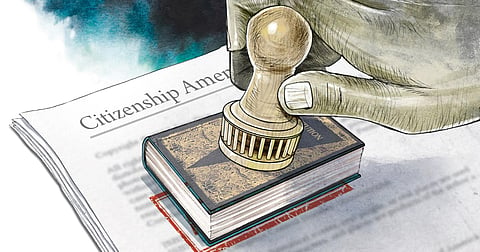

There has been much ado about the amendment to the Citizenship Act. It has been attacked as unconstitutional. At first blush the law may appear to be discriminatory and unconstitutional, but such a charge does not stand closer scrutiny. The amendment essentially seeks to facilitate religious minorities in the named countries that have a state religion acquire Indian citizenship.
The constitutional interpretation and exposition of Article 14 is well settled. The amendment does not violate Article 14. Laws may classify. The seemingly contradictory demands of legislative specialisation and constitutional generality have been resolved by the doctrine of reasonable classification. It is one that includes all persons who are similarly situated with respect to the purpose of the law. In the present case there is a reasonable, valid classification of persons of religious minorities in the three-named theocratic states who came to India before a cut-off date.
They are not treated as illegal migrants and special provisions are made as to their citizenship as a one-time measure. The amendment would help 31,313 persons who belong to this category as per figures furnished by the Intelligence Bureau to the Joint Parliamentary Committee. The law is criticised for not including Muslims from these countries as also persecuted persons in other neighbours. It is said that as a fact no Muslim from any of these or other countries has come to India seeking refuge.
Certain constitutional fundamentals are well established. There is always a presumption in favour of the constitutionality of a statute—that the legislature understands and correctly appreciates the needs of its people, that its laws are directed to problems made manifest by experience and that its discriminations are based on adequate grounds. To sustain this presumption, the court may take into account matters of common knowledge and history and assume every state of facts that can be conceived existing at the time of the legislation. A legislature acting within its domain is not bound to extend its laws to all. It is free to recognise degrees of harm and confine its laws to those where the need seemed to be clearest.
As society becomes more complicated, the greater is the diversity of its problems and more does legislation direct itself to such diversities. Law reflects distinctions that exist in fact or at least appear to exist in the judgment of the legislature. The legislature, for dealing with complex problems that arise out of an infinite variety of human relations, cannot but proceed upon some sort of classification of persons upon whom the legislation is to operate. As Justice Felix Frankfurter observed, “Laws are not abstract propositions but expressions of policy arising out of specific difficulties, addressed to the attainment of specific ends by the use of specific remedies.” When there is a classification, the court will not hold it invalid merely since the law might have been extended to others who might resemble the class for which the law is made.
This settled legal position leads to the inevitable conclusion that the law does not fall foul of Article 14. Else, we would be proving Nobel laureate Anatole France right that the law in its majestic equality forbids the rich as well as the poor to sleep under bridges and to beg in the streets. “Bare equality of treatment regardless of the inequality of realities, is neither justice nor homage to the constitutional principle.” Appeal to Article 25 as a ground of attack is equally misconceived and puerile. The locus is not simply technical. No rights of those who assail the law have been violated. No foreigner has a right to claim Indian citizenship or an easier means of acquiring it.
There is more rhetoric than legal reasoning in the contention that the law is against secularism and infringes the Constitution’s basic structure. A law can be invalidated only on the ground of lack of legislative competence or violation of any constitutional provision. Neither ground is present here. Any law regarding citizenship is within the exclusive domain of Parliament and this amendment does not infringe any constitutional provision. The basic structure doctrine is available to challenge a constitutional amendment alone and not ordinary legislation though there may be some judicial gratis dicta to the contrary stated with flourish which do not represent the correct and settled legal position.
Justice Benjamin Cardozo’s remarks come home with a strange poignancy: “The half-truths of one generation tend at times to perpetuate themselves in law as the whole truths of another, when constant repetition brings it about that qualifications taken once for granted are disregarded or forgotten.”
The amendment does not take away any Indian’s citizenship, it does not exclude anyone but does not include some within its ken. The court is concerned only with the constitutionality of a law; it ought not to be confused with its wisdom, morality or desirability, which is not the court’s concern.
While this is the legal position and people should not be misled or misinformed, it is wrong to describe those who oppose this as anti-national. Discussion and dissent are the very life breath of democracy. But no democracy can afford or support violence. Both violent protests and putting down dissent are a negation of democracy. The government is duty-bound to discuss, inform and educate the nation.
The amendment does not require the approval of any state. They have no role and some CMs opposing it is wholly irrelevant. Persons occupying constitutional positions threatening not to obey and implement it is very disturbing. It amounts to a breach of the constitutional oath of office that would render them unworthy and ineligible for public office. It also amounts to failure of the constitutional machinery inviting remedial action under the Constitution. We would do well to recall Rousseau’s admonition: “The first of all laws is to respect the laws.”
V Sudhish Pai
An expert on constitutional law
Email: vsudhishpai@gmail.com